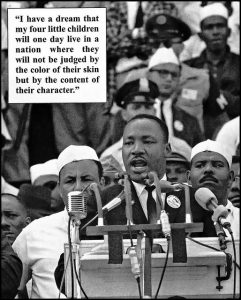
More than fifty years have passed since Martin Luther King Jr. delivered his “I have a dream” speech in 1963. While there are many signs of progress toward racial equality that progress is inadequate, incomplete and inconsistent. Far too much work remains yet unfinished.
Next Steps
The work of moving our nation forward requires everyone’s involvement. As a white male I need to become more intentional about knowing who I am and how I can help.
Over the weekend I read Jim Wallis’ new book: America’s Original Sin: Racism, White Privilege, and the Bridge to a New America (Brazos Press, 2016). Wallis is a white Evangelical pastor who has spent several decades helping to create a bridge to help our nation realize Dr. King’s dream. Out of this experience Wallis recognizes the need for white people to recognize their white privilege and to understand that “we are not now nor will we ever be a ‘postracial society” (loc. 576). Additionally, he calls us to take a deeper look within ourselves to identify our own implicit racial bias (visit Project Implicit to complete a free self-assessment).
So What?
Increased self-awareness is wonderful. For those who follow the Way of Jesus it is key to link that new awareness to God’s plan that all people are created in God’s image and should be valued as equals.
All of these changes help prepare us for individual action. Wallis challenges us to overcome the “geography of racism” that isolates races rather than providing opportunities for interaction. Recognizing that relationships are essential to crossing the bridge to a more equal future we must be intentional about starting real conversations in shared spaces including
- schools
- sports
- congregations.
And, we must recommit ourselves to working for systemic changes.
Today, as our nation celebrates Martin Luther King, Jr. Day I invite you to share one or more ways you are and/or will be working to make his dream a reality.
For further reflection check out
- The Acceptable Year of the Lord – Martin Luther King, Jr.
- Segregation: Friendship Style
- Review of The Post-Black and Post-White Church